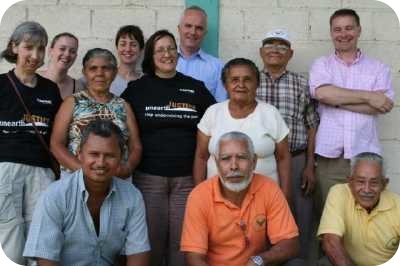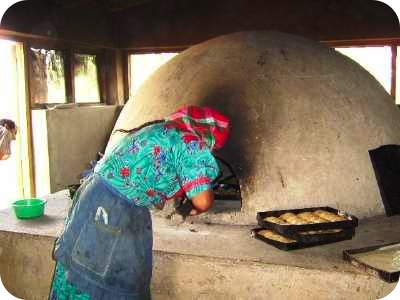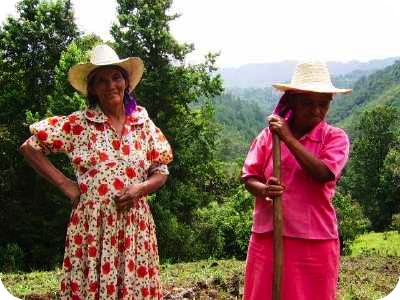CAFOD in Central America
I can honestly say the great sense of expectation with which I set out with on my visit to CAFOD’s partners and projects in Honduras and Nicaragua was completely fulfilled by the reality. It was an honour and a privilege to be a participant on the visit in June.

During the first week, we spent time with Caritas Honduras, visiting the Siria Valley’s Environmental Committee and Red COMAL, CAFOD’s partners in Honduras, who took us to visit several rural communities and fair trade producers. Without exception, we met with genuine warmth and open handed generosity that extended for the duration of each visit in both countries. It became very obvious great efforts had been made over many years on the part of CAFOD’s partners that we elicited such a reception and were genuinely welcomed wherever we went by the people we met!
I was eagerly looking forward to meeting the people from the communities of the Siria Valley, where the giant San Martin gold mine is operating. We met with members of the Environmental Committee. They were a spirited group whose ages ranged from 58 to 86 years! Their experiences were heart-rending to listen to but their passion for justice was so spirited and courageous, in the face of the blatant exploitation and injustices they have to endure.
These people have been dispossessed of their land, homes and livelihoods by greed. Gold which is currently valued at between $900-$1000 an ounce is a lucrative commodity but human life is even more precious and justice demands that we do all we can to help to protect and defend it. The people we met with were very grateful for all of the solidarity we were able to share with them from the Unearth Justice campaign activities here in England and Wales. My abiding memory is of the gratitude they expressed for our visit and of being regarded as friends who gave them strength! It was a truly humbling encounter!
With Red COMAL, an economic justice network, we visited community shops, which are a lifeline to many communities, and an organic farmer, whose fervour to reintroduce people back to the land to grow their own food organically was extremely impressive. This would be a good development as the land is so fertile and under productive. It would also help to stop the people being subjected to fluctuations in the prices they pay for food, as is the case now with rising fuel prices.
The next day, we went to visit a women’s co-operative called ‘Siempre Vivas’, which means ‘Alive and Awake Always’, who make soap and shampoo from aloe vera. They allowed us to help in mixing some shampoo, which is exported to the US, Germany and Sweden. They were very hard working women who have built up their business to such an extent that they have achieved international standards for their products. They want to try to get electricity installed so they can work for longer hours. They are very proud of all they have achieved so far and are determined to succeed further, I’m sure they will!

Then, we went to help to make bread in a community bakery. They used a stone, wood-burning oven, which looked a bit like an igloo. The smoke from the oven stung our eyes as it was not vented out of the building, something of an occupational hazard that Red COMAL are looking at technologies to improve – the sooner the better! Still Maria and Leonarda worked without letting it hamper their efforts.
There are 21 families involved in this enterprise, making bread and cakes which are sold in the community shop next door and in three other shops in the area. Everything they make is sold every day. We also visited a community farming co-operative who were using manual tools and busily clearing land in the searing midday sun in preparation for planting beans. These men, women and children ranged in age from just eight years to over 70 and came from the 28 families who were involved in this co-operative. They work every day from 7.00 am until 3.00 pm in temperatures between 35 and 40 degrees! I was astonished at their energy and sheer determination and impressed to see COMAL’s director, Trinidad Sanchez, leading by example and helping to clear the land along with them as did Tom O’Connor, CAFOD’s Director of Communities and Supporter’s Division.
In Nicaragua, during the second week, we visited a number of communities who had benefitted enormously from a five year training project led by the John XXIII Institute, a Jesuit organisation linked to the University of Central America. During this time, people are trained in a whole variety of ways to help them to effect positive changes in not only their lives but for the whole community. Two rural communities had completed the training and were very rightly proud of their achievements; the benefits were so obvious to see. In Agua de Ojo, they had installed a petrol-driven water pump which feeds four standpipes throughout the village with the result that they no longer have to walk for hours to find and carry water each day. They had helped to build their own houses and schools; they had been trained in basic health and hygiene skills, adult education and disaster risk preparedness training – a very useful skill in this flood prone area.
A project in Tipitapa, an urban shanty town on the outskirts of Managua, was just beginning with a house building programme and a community mapping workshop where the community identify their environment and highlight the parts they would like to change. They are supported throughout this process by the John XXIII Institute, who provide technical and legal expertise as well as community support workers who accompany the community during the life of the project. After the five years have ended, the Institute leaves the people to develop further on their own. It would be wonderful to visit again at the end of the five years to see the transformation which I am sure will occur in both the people and the environment.

Each experience was unique and unrepeated but it was the way in which whole communities came together around a common purpose that was truly inspiring to witness. Everyone we met was honest, proud and hard working, making the most of the little they had and generously sharing their time and hospitality with us. It was a truly moving experience to arrive at each location and be met by a smiling welcome and genuine warmth and then to listen as they openly spoke, at length and in great detail of all that had occurred to bring them to their present situation.
I am left with a great sense of privilege to have been able to witness such truly human development. It makes me proud to be able to work to support such initiatives and for the good of others, who do not have any of the privileges we can often take for granted. If you ever doubted the difference your donations to CAFOD make, I hope my experiences will reassure you – it makes a whole world of difference to the people!
In fact, it is hard to share everything I saw with you through this short article but if you would like to hear more about it, I will be very happy to come to visit parishes and schools, just get in touch with me at the CAFOD Office. Finally, it would be very remiss of me to end without extending to all our wonderful supporters the very grateful thanks of everyone we met for all the help and support that you give to them through CAFOD – you would be very proud to see the results of your generosity in action!
Carol Cross
CAFOD Diocesan Officer, Middlesbrough Diocese
